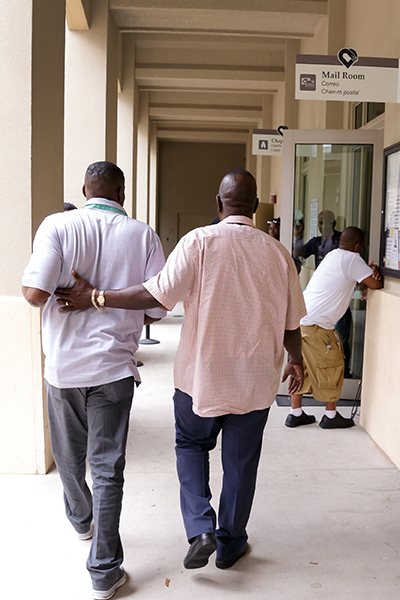By Tom Tracy - Florida Catholic
- See related story: "We can preach louder with our actions than with our words"
MIAMI | An estimated 30 percent of chronically homeless persons are thought to be severely mentally ill, and many others are physically disabled.
Over the years, experts note, many of the chronically homeless have ended up in jail, for lack of a better place for them other than the streets. Psychiatric hospitalization can cost $3,000 a day or more locally, or $17,000 for up to five days of hospitalization.

Photographer: TOM TRACY | FC
At Camillus House, Hospitaller Brother Mateo Fenza poses in front of the mural of the "lost sheep" in the chapel, one of the new Camillus buildings. The former soup kitchen now includes a behavioral health treatment and residential facility, medical and service space, dining hall and cafe, parking garage, commercial kitchen, offices, educational spaces, and an auditorium.
A merciful answer arrived earlier this year when Miami’s Camillus House helped launch a new jail diversion/re-entry program which offers law enforcement and the community another option for nonviolent misdemeanor defendants who are homeless and suffering with serious mental illnesses and/or substance abuse.
Camillus House & Health has partnered with Miami-Dade Circuit Judge Steve Leifman and the 11th Judicial Circuit Jail Diversion Program to provide supportive housing for many such homeless, offering the community a win-win.
Mental illness
Sam Gil, Camillus House vice president of community integration, notes there are an estimated 4,400 people in the Miami-Dade County jail, and 17 percent of this population suffers with mental illness. That makes the jail the largest psychiatric care facility in the state of Florida, at a cost to taxpayers of $80 million annually, or $220,000 a day.
According to national research, people with mental illness stay in jail eight times longer than other people, Gil noted. The goal of the Camillus program is to avoid incarceration and provide a humane avenue back into society by providing the homeless with services that include a combination of psychiatric treatment, primary medical care and housing.
“Pope Francis reminds us that mercy and forgiveness 'must not remain beautiful words, but must be realized in daily life’ and I think that’s what this program tries to accomplish,” Gil said.
Established by the Little Brothers of the Good Shepherd in 1960, Camillus House has grown over the years from a small overnight shelter into a full service center offering a “system of care” for persons who are poor and homeless.
Austin Jerani, Camillus’ jail diversion program director and director of psychological services, notes that Camillus has been able to help homeless who repeatedly have gone before a judge after arrests for trespassing or substance abuse. A judge can elect to offer the individual jail or the re-entry program.
“While they are in the program they are free to come and go, and if they decide to leave (that) triggers the issue of an arrest warrant. We have a great relationship with the court’s team and it is a collaboration, bringing to their attention the importance of them staying in the program,” Jerani said.

Photographer: TOM TRACY | FC
Fred Mimes, right, director of direct care ministry, and client James Wilson walk the courtyard at Miami's Camillus House, a full service center offering a system of care for persons who are poor and homeless.
The undertaking began in July 2015, when the state awarded Camillus funding for 28 beds for women and men; 20 beds are funded by the state and the other eight by the Homeless Trust in Miami-Dade County. Those re-entry program beds are located at the main Camillus campus and at its Charity Unlimited building.
“Individuals have access to group therapy, life skills education and job training — it helps them learn the tools to succeed in life,” Jerani said. “When people come in they have a whole list of things they need and it's our job to work with them to help them obtain these benefits.”
Lazarus Project
Judge Leifman, who chairs the Supreme Court of Florida’s task force on substance abuse and mental health issues, told The Florida Catholic he is not aware of anything quite like the jail diversion program for homeless nationwide. He also pointed out a related Lazarus Project at Camillus House, in which staff medical professionals and social workers go into Miami’s streets to offer support for the chronically homeless.
“It’s very innovative,” Judge Leifman said. “Many of these individuals are there not because they want to be homeless, but their illness makes it really difficult for them, or certain housing programs are too stimulating for them and it makes it too difficult for them to come in. They just want to be left alone.”
Such outreach helps reestablish ties and relationships with the chronically homeless and slowly encourages them to take their medication, so “we can reduce symptomatology and get them into housing,” the judge said. “It’s a wonderful start.”
The jail diversion project also offers training to local law enforcement officers on how to avoid arresting people with mental issues, and three post-arrest programs that address housing needs, psychological treatment, meaningful day activities, employment skills and more.
“Camillus House is one of our primary providers for our services and they are doing an amazing job taking some of our most difficult people and trying to get them services,” the judge said. “The Lazarus Project is related in that sometimes we share populations that are in and out of the criminal justice system for sleeping on the sidewalks or something else that gets them arrested.”
Both jail diversion and the Lazarus Project are having a positive effect in the Miami community, given the high rate of mental illness among the homeless here, he added.
“The beauty of the Lazarus Project is we shouldn’t be waiting for people to get arrested to establish relationships with them; the relationship with Camillus staff is equally important,” Judge Leifman said.
'Holistic approach'
“Because of these illnesses they tend to just give up on life and get depressed on top of their other illnesses. It is one of the simplest most elegant things of life to help someone establish relationships leading to starting the recovery process,” he said. “It's not about giving someone a pill, it's a holistic approach.”
Meanwhile, the Miami community is hoping to build a new, larger jail diversion facility, and Camillus House may be its future service provider, the judge noted.
“We are all in the same page in the community to help people with these illnesses. It is one of the finest examples of human work — to reach out to people who are so vulnerable and ill and Camillus is living up to its moral obligations in the community.”

